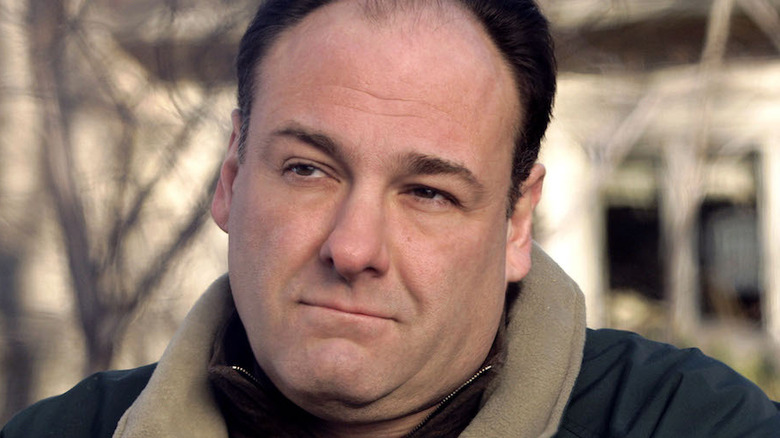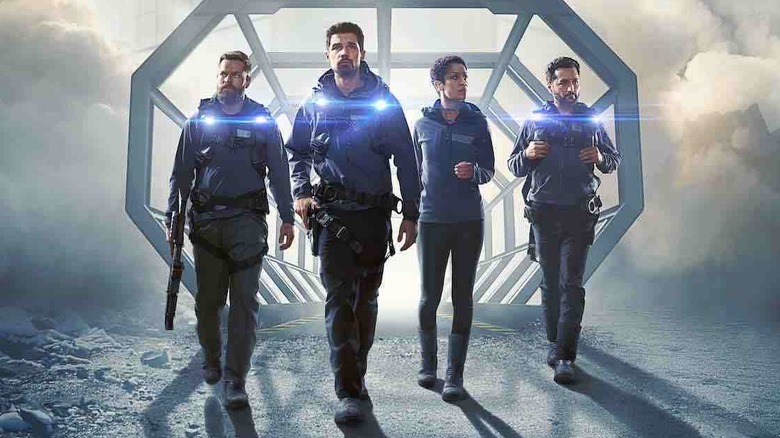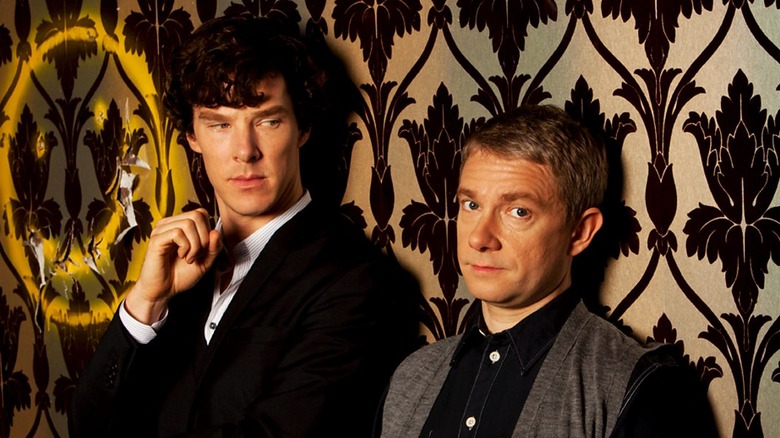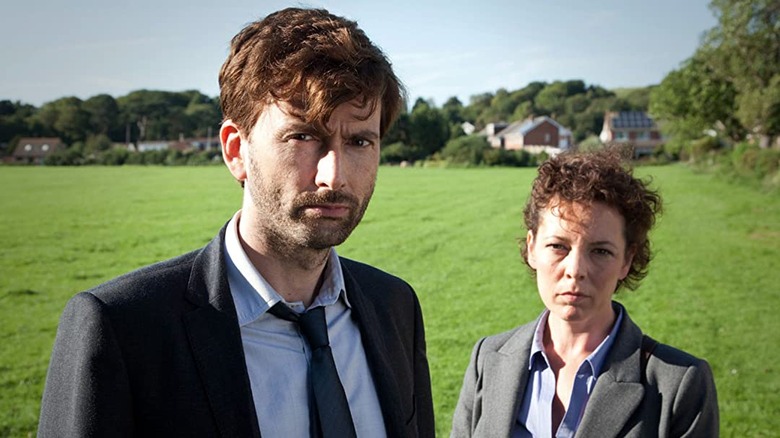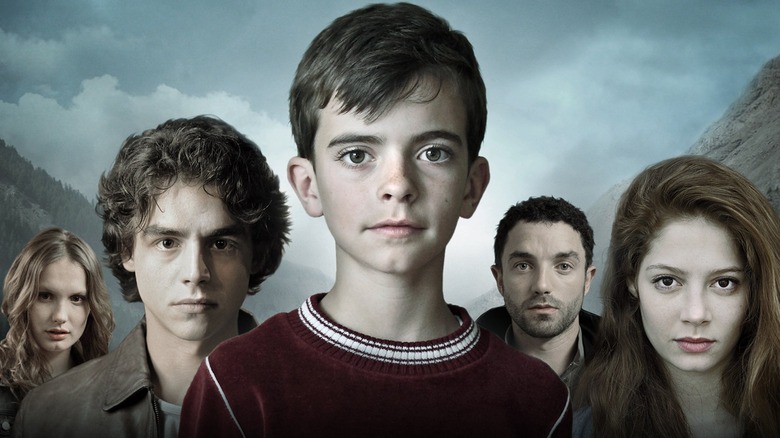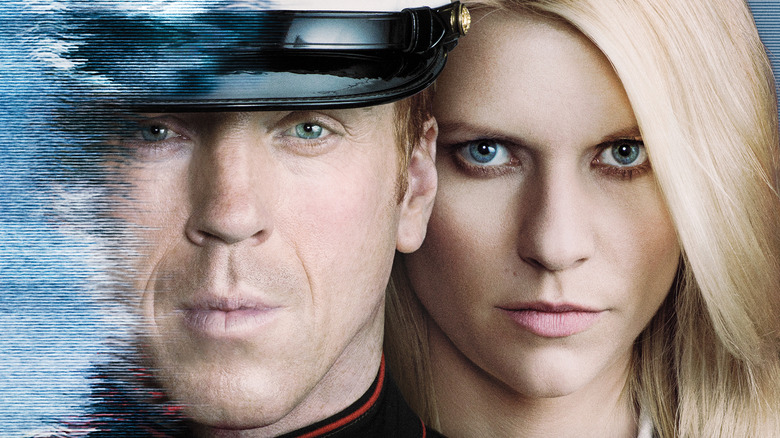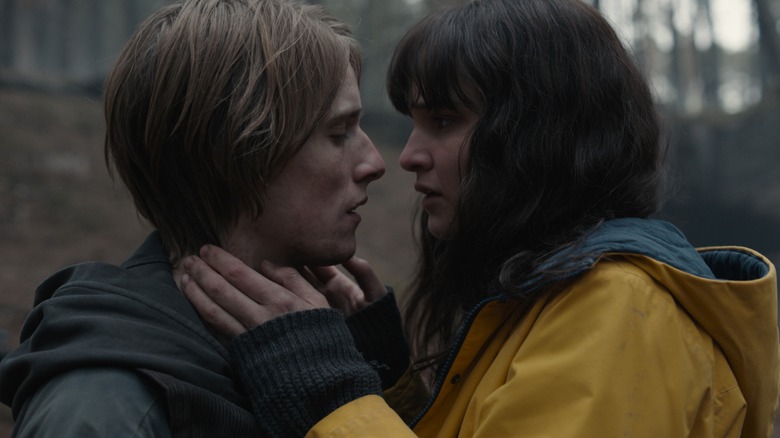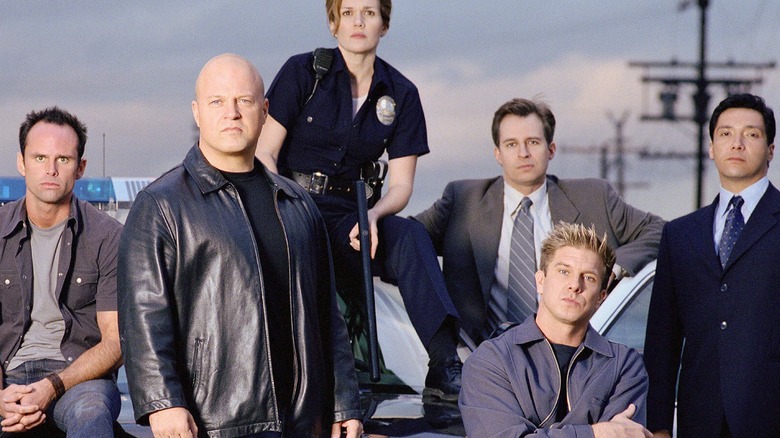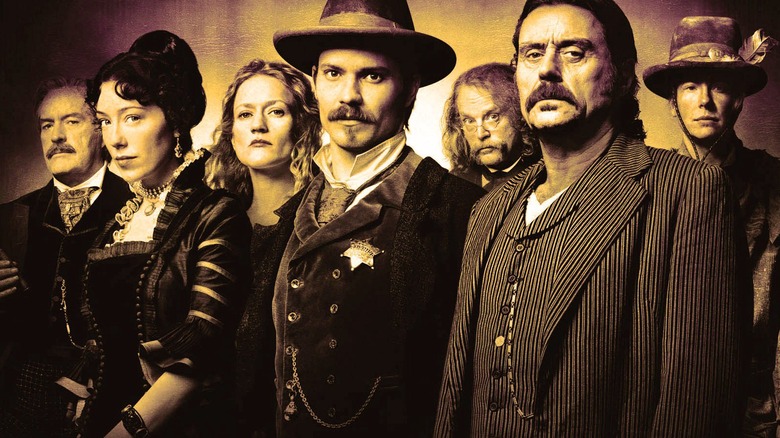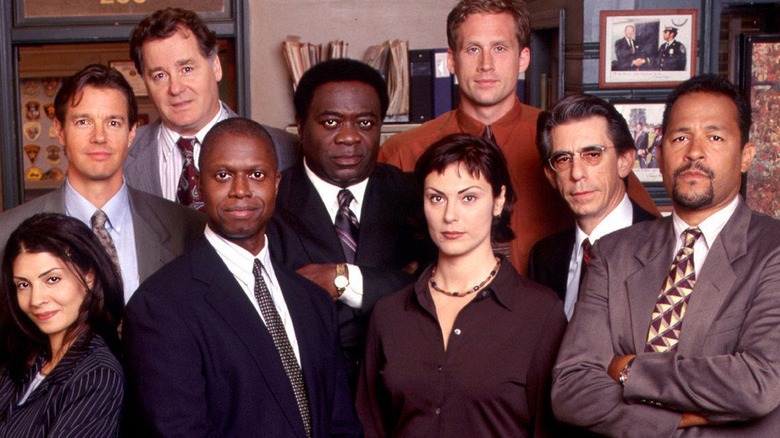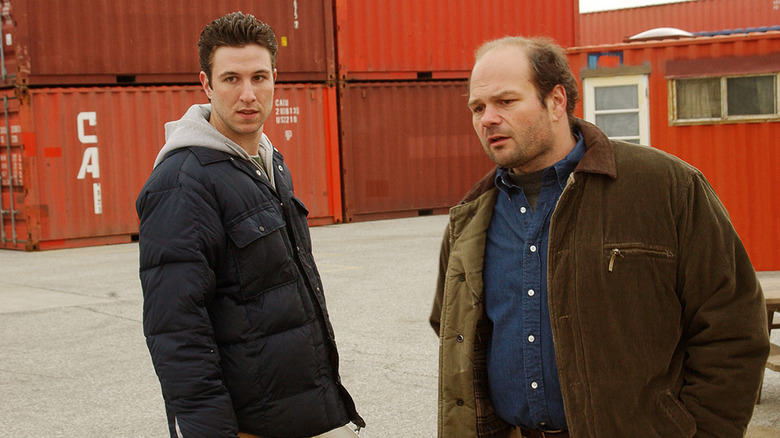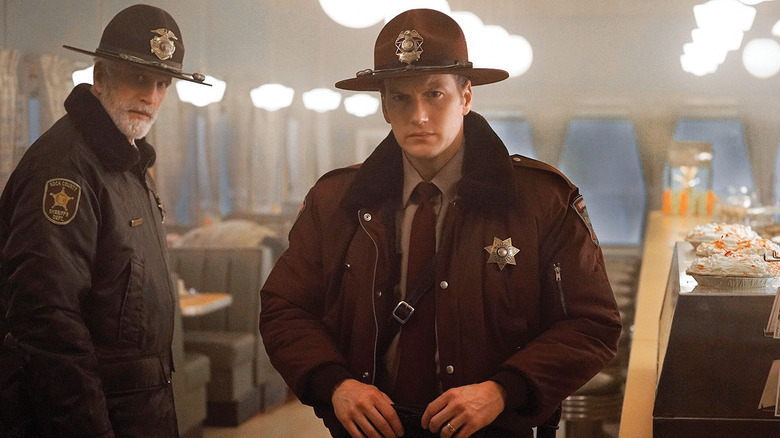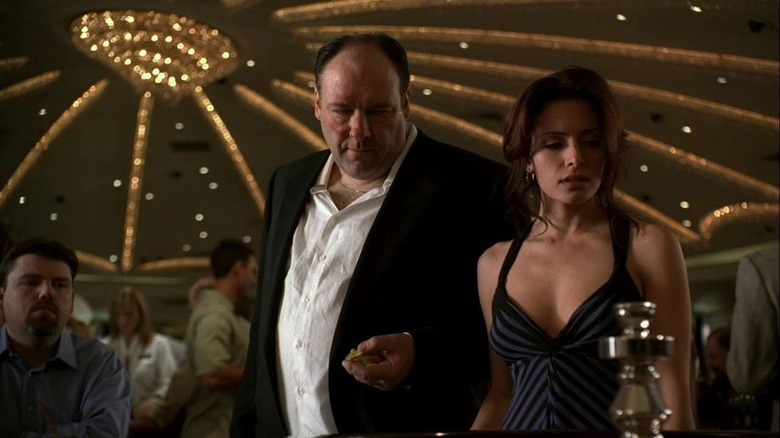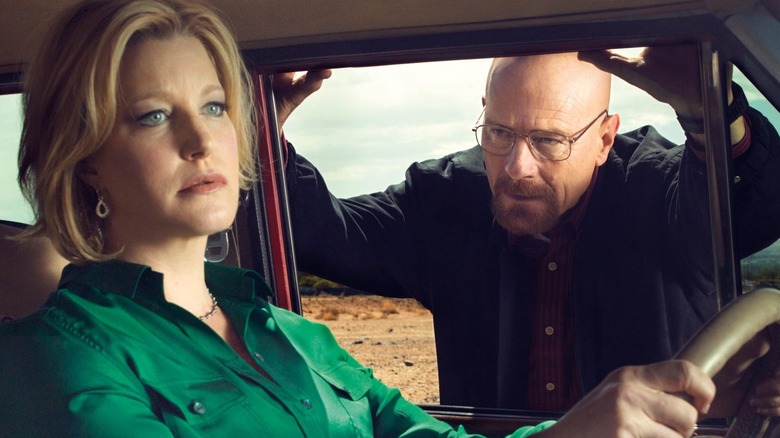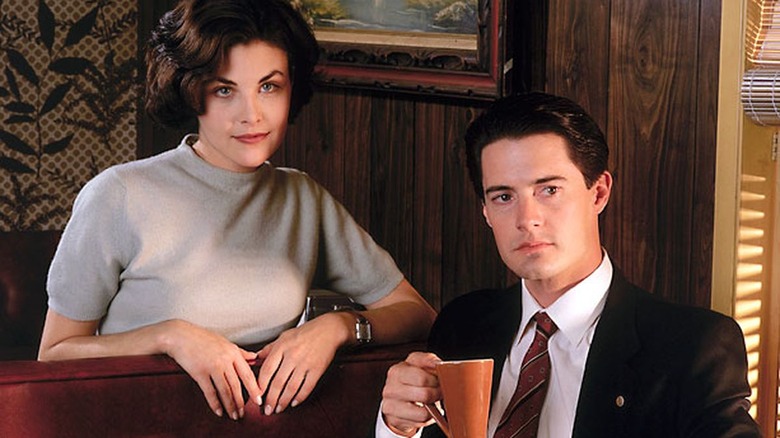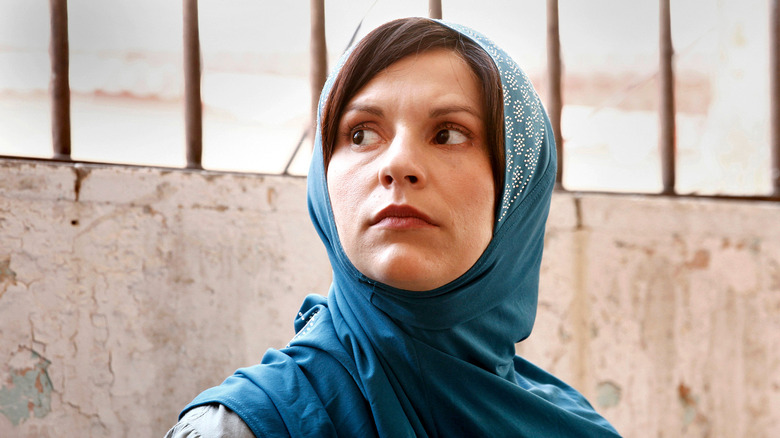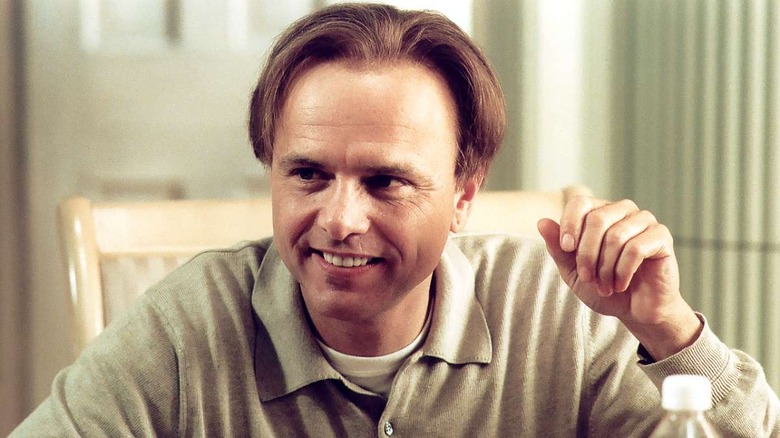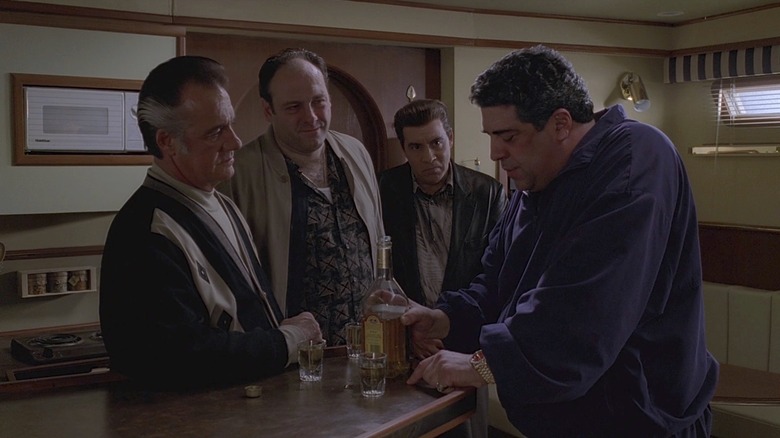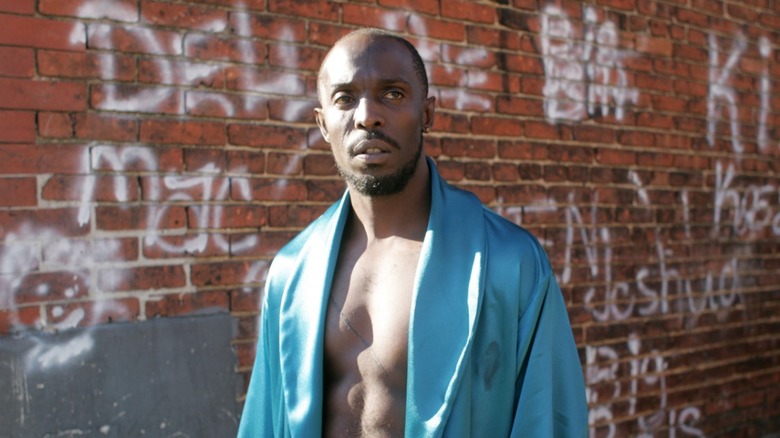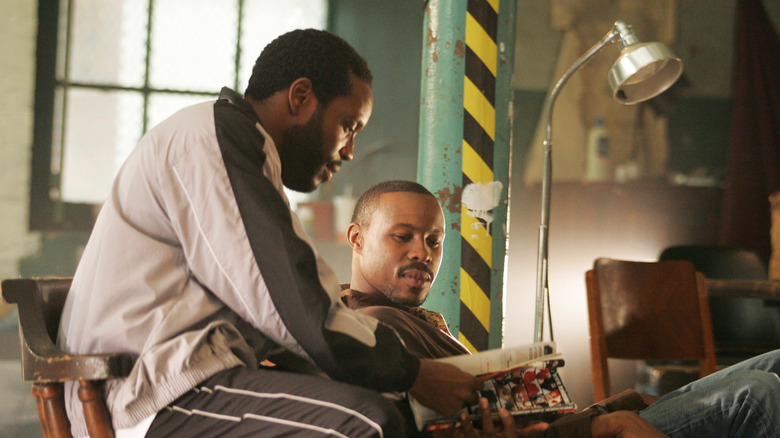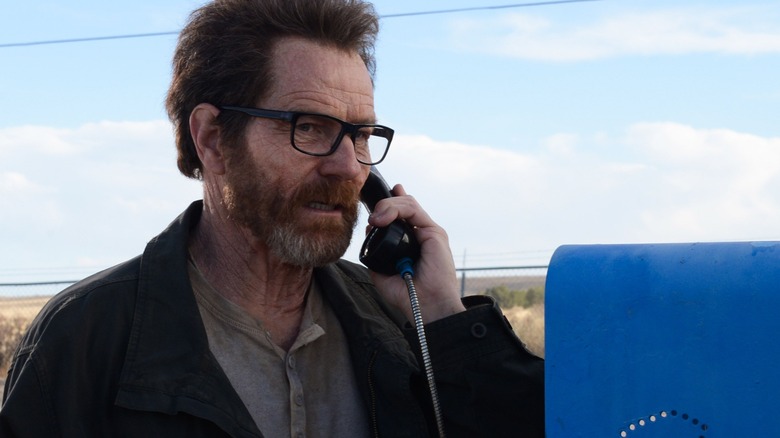Metacritic's Only 20 Near-Perfect Seasons Of Suspense TV Shows
In the real world, we typically experience suspense as a reaction to the possibility of disappointment or physical harm. So unless we're talking about what we feel in thrilling but meticulously-controlled situations — roller coasters, for example — suspense is horrible. That's probably one of the reasons why we like suspense in our entertainment so much: It allows us to experience the vicarious adrenaline rush of potential catastrophe, without encountering any actual danger.
As Metacritic's list of near-perfect seasons of suspense-based television evidences, suspense is an essential ingredient in some of TV's greatest-ever series. Interestingly, this list is fairly genre-flexible, beyond the fact that each season is suspense-forward: It encompasses prestige dramas, crime procedurals, surrealist soap operas, searing sci-fi sagas, and more. If you're aiming to watch something that'll make you jump out of your seat and exclaim an obscenity so loudly you'll have to apologize to your neighbor, these are the seasons of TV to check out, according to critics. Just be sure to remember your breathing exercises.
The Expanse (Season 4)
Why is it so hard to keep a sci-fi series on the air? It's a popular genre (we think?) that attracts oodles of television's best and brightest creative talents. And yet, the networks pull the plug on some of sci-fi television's most interesting and well-received efforts, like "Firefly," "Sense8," and "Jericho." "Futurama" and "Sliders" were both canceled twice, while "Mystery Science Theater 3000" has been canceled three times. What the heck is happening?
"The Expanse" almost met a dire fate after SyFy kicked it to the curb in 2018. Luckily, according to Variety, its loyal followers include "Game of Thrones" creator George R.R. Martin, Amazon founder Jeff Bezos, and actual astronauts. Partially due to Bezos' appreciation of the project, Amazon Prime picked up the space exploration saga. The cast and crew justified the second go 'round by delivering their best-reviewed season yet. Y'know who looks silly here? SyFy executives, that's who.
Despite the comparative success of its Amazon run, Season 6 of "The Expanse" is its definitive conclusion ... we think.
Sherlock (Season 2)
There was a time, in the pre-"Sherlock" world, when most of us heard the phrase "BBC mystery" and thought, "old, bland, difficult-to-follow program grandma enjoys." But, to indulge a cliché, "Sherlock" is not your grandma's Sherlock Holmes. Nor is it a blockbuster franchise starring Robert Downey Jr., nor an American network TV show starring Lucy Liu. This Sherlock Holmes is for the contemporary, sophisticated consumer of genre fiction; the kind of person who recognizes that there was a window of opportunity for a "Doctor Who"-"Sherlock" crossover while Steven Moffat was in charge of both shows. Since Moffat officially left "Doctor Who" in 2017, and we don't even know if Benedict Cumberbatch or Martin Freeman have time for Sherlock Holmes and John Watson anymore, the universe probably missed its chance. Oh well. Good thing we have "Sherlock" to comfort us.
Emerging on the BBC to utterly monster ratings in 2010, this modernized take on Arthur Conan Doyle's smarmy crime-buster delivered its best-reviewed pack of episodes in 2012. "Sherlock" Season 2 includes a dominatrix with a taste for anarchy, something very much like a werewolf, and the machinations of Sherlock's evil counterpart, Jim Moriarty (Andrew Scott). It's "Sherlock" at its absolute best.
Broadchurch (Season 1)
As ardent consumers of sci-fi and fantasy-oriented media, we can't help but scan the basic conditions surrounding "Broadchurch" and notice the presence of actors David Tennant, Jodie Whittaker, Arthur Darvill, and showrunner-creator Chris Chibnall. "Ah ha," we immediately think, "there's a significantly-sized burlap sack full of 'Doctor Who' connections here."
However, this acclaimed 2013 small town crime drama doesn't share the whimsical sensibilities of "Doctor Who." In fact, it's downright somber. The premise is brutally simple: Detective Inspector Alec Hardy (Tennant) and Detective Sergeant Ellie Miller (Olivia Colman) must investigate the questionable death of an 11-year-old boy in the eponymous seaside town. Though you might recognize Tennant and Whittaker as the Doctor and Colman as the Queen of England, those titles and their associated abilities quickly vanish from the forefront of your mind — they are at the height of their powers as actors here. "Broadchurch" Season 1 captures a community in crisis from a vast variety of angles: Local shopkeepers, harried parents, bloody-minded reporters, and frightened children come together to tell this story, from a thousand different positions of complicity and innocence.
The Returned (Season 1)
We should immediately clarify that Metacritic bestows near-perfect status on the first season of the original French version of "The Returned." It does not express that sentiment about the American version, which ran on A&E for a single season in 2015.
In "The Returned," a handful of deceased individuals abruptly reappear and attempt to pick up their lives where they left off. For many friends and family of the returned, this is a cause for celebration. For some, however — sometimes the same people — it is a cause for existential horror and the type of sublime dread that can drive folks stark raving bonkers. The newly undead range from a butterfly formerly pinned into a display collection to a serial killer who promptly resumes his bloody rampage, so the cause for alarm is not purely scientific or philosophical.
What kind of stakes does "The Returned" saddle its grippy premise with? Well, a school bus drives off a cliff in the first episode. That happens in both versions, actually, so don't go thinking the American version is easier viewing.
Homeland (Season 1)
It's pretty unusual for a single actor to star in a pair of smash-hit television shows over the course of their career, especially when those shows are produced decades apart and have essentially nothing else in common. So bully for one-time "My So-Called Life" lead Claire Danes, even if her character on "Homeland" has a pretty rough time in Season 1, which aired in 2011. CIA Agent Carrie Mathison (Danes) suspects U.S. Marine and recently-returned POW Nicholas Brody (Damian Lewis) may have been brainwashed into joining the Al-Qaeda terrorist syndicate. Mathison is not always taken seriously by her superiors, which is troubling, as even Nicholas' wife Jessica (Morena Baccarin) suspects something's gone awry with her ostensibly heroic hubby.
Meanwhile, Mandy Patinkin plays CIA officer Saul Berenson, a mentor figure to Mathison. In the respect that Mandy Patinkin plays a prickly but well-meaning surrogate father figure to a blonde woman, "Homeland" is kind of like "Dead Like Me" ... which was, back in the mid-'00s, oft-described as a supernatural version of "My So-Called Life." Television is a flat circle, people. It's time to accept this.
Dark (Season 3)
The very idea of harm befalling a child has a lot of power. It's both unfathomable in its sheer awfulness and cruelty, and totally plausible compared to other upsetting occurrences like, say, cannibalistic puppies. This is probably why so many sci-fi/thriller/crime dramas begin with children going missing: Heck, if you've read this list from the beginning, you glanced at a few examples in your very recent past. They don't all incorporate extraordinary elements like time travel and alternate realities, though, as "Dark" does, let alone take them so far that discussions of things called "God particles" become key parts of the story.
Netflix's German-language sleeper hit jumps off from the boilerplate story beat of missing kids into the storytelling stratosphere. By Season 3, it's landed somewhere else entirely: That superbly-received season incorporates parallel worlds, quantum entanglement, and the gosh-darn apocalypse. While "Dark" has been compared to "Stranger Things," take note: "Dark" does not devote its Season 3 to mall culture nostalgia.
The Shield (Season 1)
After generations of watching sympathetic, handsome, do-gooder cops on TV, we finally got a properly crooked scumbag with 2002's "The Shield." In a 2017 EW article, creator Shawn Ryan explained that he went on plenty of ride-alongs with police for research and inspiration during his stint writing for "Nash Bridges." The unpleasant or questionable realities he witnessed created the mental framework for Detective Vic Mackey, played by Michael Chiklis. Mackey, his strike team, and other cops murder, plunder, brazenly disregard the constitutional rights of their suspects, demonstrate total indifference for victims, and engage in all manner of other disreputable behaviors.
It's a cop show with a fair share of overly-crass humor, so it's not for everyone. However, "The Shield" Season 1 easily earns its place among television's all-time most suspenseful endeavors via razor sharp edits, a fast pace, and imaginative camerawork. The fact that it happened to be a rated TV-MA program that aired on basic cable — a rarity in 2002 — couldn't have hurt its thrill-inducing factor, either.
Deadwood (Season 2)
As far as entities from the mid-'00s golden age of television go, "Deadwood" stands as the definition of underrated. In contrast to prestige cable dramas of the same decade, it never quite managed to break through to the status of monocultural, like "The Sopranos," "Breaking Bad," or "Mad Men" did. HBO didn't even keep it in production for more than three seasons, topped off by a film serving as the de facto series finale. And yet, celebrated critic Emily VanDerWerff describes Season 2 as "the greatest achievement of the televisual form."
So hey, maybe more of us should sit down and give "Deadwood" a serious once-over? In the most practical terms possible, Season 2 of the dusty, mangy western is an essential watch for connoisseurs of low-tech violence, men with unfortunate faces who spout morbid philosophy, and, of course, Timothy Olyphant. What would Season 1 of "Westworld" be like if none of the characters were robots? The answer may lie with "Deadwood."
Homicide: Life of the Street (Season 1)
There are countless police procedurals on television. A few break away from the pack to become cultural institutions, and "Homicide: Life on the Street" eventually became a genre highlight with historic significance. Yet it's stranded in an odd place in the cultural imagination: "Homicide" lacks the longevity of Dick Wolf's "Law & Order" franchise, or the unqualified, ongoing critical acclaim of "The Wire." However, "Homicide" filled a gritty network TV cop show void throughout the '90s. Moreover, we can certainly say the show's casting directors had a keen eye for actors who click on suspenseful crime-oriented television.
Much has been made of the many actors "Homicide" shares with "The Wire," both of which happen to occur in fictionalized versions of Baltimore. However, If we let our attention wander over to the "Homicide" IMDB, we can observe its frankly dazzling list guest stars, including Steve Buscemi, Edie Falco, and Giancarlo Esposito. So yeah, "Homicide" also shares a star or two with "The Sopranos" and "Breaking Bad" — two other series with multiple seasons on this list. That definitely earns it special bragging rights, in addition to the fact that it laid some major thematic groundwork for those massively acclaimed series.
The Wire (Season 2)
Traditionally, TV shows about inner-city crime and the police officers ostensibly charged with keeping it under control feature sympathetic, fair-minded cops and explicitly predatory criminals. Every police procedural on this list bends or disregards that paradigm, which might tell us something about how moral ambiguity can be useful in creating an aura of suspense. But we didn't see mainstream television often draw one-to-one parallels between drug-running syndicates and law-enforcement organizations until "The Shield" and "The Wire."
Of the two, "The Wire" leans harder in the direction of prestige television and an ability to tackle issues that arise in the real world. For instance, Season 2 includes dock workers who — claiming difficult economic conditions have forced them into a life of crime — illegally acquire and redistribute luxury items. We realize that description might not convey an ample degree of suspense by itself, but take our word for it — "The Wire" is definitely an edge-of-your-seat kinda deal. The distance between that ho-hum description and the show's profuse praise is proof: There's nothing this show can't make compelling.
Fargo (Season 2)
What the heck is up with Fargo, North Dakota? As far as we can tell at a glance, it's an ordinary American town. Despite its purported normalcy, however, bizarre, violent crimes appear to occur on a semi-frequent basis, and many of the town's residents closely resemble major movie stars. For instance, former used car salesman Jerry Lundegaard bears a close similarity to William H. Macy, and ex-cop Marge Gunderson looks quite a bit like Oscar winner Frances McDormand. Those folks were around Fargo in the '90s, but back in the late '70s, certain other Fargo residents were dead ringers for famous folks like Kirsten Dunst, Jesse Plemons, and Patrick Wilson.
Okay, okay, we kid, we admit it. But that's how powerful "Fargo" is — especially Season 2. Much like the critical darling that was the first season of the FX series, a spinoff of the untouchable 1996 dark comedy from the Coen Brothers, Season 2 of "Fargo" melds nihilistic atrocities with good-natured manners and practical Midwestern sensibilities. Somehow, even decades after that film hit theaters, "Fargo" remains unlike anything else.
The Sopranos (Season 6)
The world that's built up around Tony Soprano (James Gandolfini) over the course of the first five seasons gradually crumbles in the double-length final lap of "The Sopranos." Back in 2007, the supposed ambiguity of the final scene led to much hullaballoo, although some of us argue that the ending isn't actually all that abstract. Seriously, listen to Tony and Bobby Baccalieri's conversation from Season 6's "Soprano Home Movies," — especially the part about what Bobby (Steve Schirripa) doesn't expect to hear — if you're confused about what really happens.
"The Sopranos" begins as a lively and gleefully sleazy R-rated cable drama, then becomes the show that proved to be a tentpole of our modern golden age of television. Gandolfini's creatively triumphant final season is, paradoxically, a downward spiral with a merciless nadir for Tony, his biological family, and his figurative family. This is the year the hungry specter of violence overshadows and consumes the decadence of it all, and the question arises: Maybe it is, in fact, time to stop believing? Unless it's too late for it to make a difference? (It is.)
We think any half-bright person can put two and two together and figure out what happens to Tony. But (spoiler alert, maybe?) "The Sopranos" does not tell us the ultimate fate and/or future of Paulie Walnuts (Tony Sirico). How come everyone in 2007 was so concerned about Tony? Why wasn't anyone asking what happened to Paulie?!
Breaking Bad (Season 4)
The penultimate season of "Breaking Bad" sets the table for the seven-course meal of intensity that follows, but it's also a gasper in its own right. Fast-food magnate and secret crime lord Gus Fring (Giancarlo Esposito) coerces Walter White (Bryan Cranston) and Jesse Pinkman (Aaron Paul) to cook blue meth on behalf of his organization, to Walt's significant disgruntlement. Lots of action and attention-grabbing goings-on take place: Walt's brother in-law and D.E.A. agent Hank Schrader (Dean Norris) assumes he's wrapped the "Heisenberg" case, then accurately second-guesses himself due to Walt's wildly arrogant encouragement. Jesse experiences one of his many nervous breakdowns. Skyler devises a plan to hide the Whites' colossal volume of meth-generated cash by buying a car wash, which works out surprisingly well, relative to how plans made on "Breaking Bad" typically pan out.
The audience gets to spend more time with series favorite Mike Ehrmantraut (Jonathan Banks), a scrappy brawler and low-level gangster with a heart of ... well, not gold, exactly. Probably not silver, either. Perhaps his heart is made of bronze, or another significantly less precious metal. This is also the year Walt delivers his character-redefining "I am the one who knocks" monologue, which packs a wallop. It also not-so-subtly indicates that Walt's bought into his own hype. Walt used to seem like such a grounded guy. What kind of goofball maniac says things like "I am the danger!" in earnest?
Twin Peaks (Season 1)
By blending dream logic and self-styled supernaturalism into the long-established crime procedural template, David Lynch and Mark Frost conjured up a show whose ramifications are felt throughout this, and essentially every other "best of" TV-related internet list. But if you only understand "Twin Peaks" as a media property that seems to excite pretentious people, you might not realize that 1990's Season 1 is only eight episodes long. So for all the correct discussion of its sprawling narrative and confounding symbolism, getting into "Twin Peaks" isn't actually the major time commitment its notices might lead to you expect. In fact, some folks will tell you that you can skip most (definitely not all, but most) of Season 2, and jump ahead to misunderstood 1992 prequel film "Twin Peaks: Fire Walk with Me," plus the incredible 2017 relaunch season.
In Season 1, Special Agent Dale Cooper (Kyle MacLachlan) arrives in the tiny, sleepy logging community of Twin Peaks, Washington, to investigate the murder of popular and seemingly wholesome high school student Laura Palmer (Sheryl Lee). But just like Laura herself, Twin Peaks has a dark side. Some of that darkness — drug deals, arson, insurance fraud, matters of that nature — comes from the familiar, material world. And some of that darkness comes from somewhere else.
Homeland (Season 2)
It's nice to be able to say "I told you so." But most of the time, when people are told they're wrong and later exonerated, they prefer to not have to undergo controversial electroshock therapy, wait six months, go on a covert and dangerous information extraction mission on the other side of the planet, and, only after all that, prove that the guy they thought was secretly a terrorist was, in fact, a secret terrorist.
Agent Carrie Mathison continues her adventures as the world's unluckiest CIA agent in Season 2 of "Homeland," only this time, Manchurian candidate and former US Marine Nicholas Brody might be working as something more like a triple agent than a double agent. Could it be that they're possibly on the same side? Could the Marine-turned-congressman, who either is or was a secret terrorist, develop genuine romantic feelings for the attractive CIA agent who sniffed him out from the get-go? Does that seem a little cornball for a show that's ostensibly a reflection of real world anti-terrorism black ops? Whether it is or isn't, boy, is it ever suspenseful!
The Sopranos (Season 3)
Part of the entire appeal of "The Sopranos" is its lack of conventionally-defined heroes and villains, so calling Ralph Cifaretto (Joe Pantoliano) a "villain" isn't quite accurate. It is accurate to say that Tony Soprano is an unrepentant mass murderer, and Ralphie makes him look like a reasonable, relatable human being by comparison. Meanwhile, the only actual reasonable and relatable "Sopranos" character is clearly Adriana La Cerva (Drea de Matteo). Naturally, she's also the member of Tony's social and professional circle the FBI singles out to harass and manipulate. It appears New Jersey is not a fair place to live.
Ralphie shows up and demonstrates his thorough awfulness in 2001's Season 3, but much of the chaos emanates from a more tragic figure — Jackie Aprile Jr. (Jason Cerbone), the son of Tony's mafia mentor. Along with basically everybody who respected Jackie Sr., Tony hopes to aim Jackie Jr. away from the mobster lifestyle. But not everyone in Jackie Jr.'s life — or Jackie Jr. himself, for that matter — shares that long-term agenda. This becomes an even bigger problem when Jackie Jr. hooks up with Meadow Soprano (Jamie-Lynn Sigler). The don of New Jersey does not appreciate his daughter dating an unstable person.
The Sopranos (Season 2)
Let us note that while Metacritic technically ranks "The Sopranos" Season 2 above Season 3, the aggregator also scores both batches of episodes at 97 out of 100. Even if you're the type of "Sopranos" fan inclined to argue that the series doesn't truly ascend until its third year, Metacritic doesn't necessarily disagree with you. Furthermore, Season 3 can't happen without the groundwork laid down during year two. Ralphie and Anthony "Tony B" Blundetto (Steve Buscemi) might be superior incidental adversaries to Tony Soprano, but Richie Aprile (David Proval) establishes the template for both of them in Season 2. Did you think Ralphie invented the idea of dating Tony's sister Janice Soprano (Aida Turturro)? No. Dating Janice was Richie's idea. Obviously.
What else does Season 2 do? Well, it introduces America, and especially Carmela Soprano (Edie Falco), to a handsome native Italian named Furio Giunta (Federico Castelluccio). It marks the show's first sojourn into dream logic. It resolves the nasty business surrounding the FBI and their interactions with Sal "Big Pussy" Bonpensiero (Vincent Pastore). Basically, this is the season that made everybody stop comparing "The Sopranos" to "Analyze This," the Robert De Niro comedy that also happens to be about a mob boss and his therapist, which came out the same year as "The Sopranos" Season 1.
The Wire (Season 4)
We understand that the realities of inner-city gang warfare are profoundly ugly, and "The Wire" seeks to reflect that. We also don't want to give the impression that we at Looper are all a bunch of thin-skinned pearl-clutchers. But listen, the first thing that happens in the trailer for "The Wire" Season 4 is a little kid points a gun at another little kid. That's really upsetting! And we should emphasize that HBO opted to show us this in the trailer – as in, this is what the network put in material designed to give you an idea of what's on the show, without giving too much away. Hyper-violent though they may be, "The Sopranos" and "Breaking Bad" never get hardcore enough for high schoolers to pull box cutters on each other.
As you've likely inferred, based on these circumstances, "The Wire" Season 4 might be too intense for the faint of heart. However, you should also keep in mind that by scoring a 98 on Metacritic, this year of "The Wire" transcends the "suspenseful" qualifier and meets the criteria for one of the review aggregator's top 10 seasons of TV of any genre, of all time.
The Wire (Season 3)
Season 3 of "The Wire" offers a rigorous inventory of the fraught relationship between the heights of Baltimore's political power and the city's deepest lows of economic hardship. And before you ask, yes, that is Aidan Gillen, a.k.a. Petyr "Littlefinger" Baelish playing smarmy politician Tommy Carcetti. He looks very strange without his mustache, but boy, does the man excel at portraying a particular type of power-hungry jerk. If you think it might be distracting to watch him tool around Baltimore instead of Westeros, take heed: Season 3 of "The Wire" contains what many critics believe to be the single greatest hour of the series in the form of Episode 11, "Middle Ground." It's so explosively good, you'll briefly forget any other show exists, let alone features the same actors.
Only a handful of TV seasons of any program top Season 3 of "The Wire," according to Metacritic. And even then, it's incredibly close. This is the peak of a series that is, undoubtedly, one of the greatest ever produced.
Breaking Bad (Season 5)
"Breaking Bad" gets compared to "The Sopranos" all the time. Sure, both shows are certified classics whose main characters are both the heads of suburban households and major criminals. But apart from that admittedly significant similarity, they're not that much alike — especially during their respective final seasons. Whereas "The Sopranos" stares into the abyss and waits patiently for it to gaze back, "Breaking Bad" runs screaming and crying into the endless nothingness like it's on a deadline.
Walter White's kept his public identity separate from his life as meth kingpin Heisenberg for a few years. But here, Hank finally puts the pieces together, and various permutations of mass mayhem unfold as a result. The final season of "Breaking Bad" helped introduce Jesse Plemons — who plays Todd the horrible Nazi — to a broader segment of the entertainment-consuming population. Unfortunately for Walt, Jesse, and many other people, they soon become acquainted with Todd's equally horrible Nazi buddies, especially Todd's Uncle Jack.
You might say "Breaking Bad" ends in a blaze of glory, which is true in terms of its quality as a television program. But as far as the events within the series go, it's more like a blaze of anguish, disgrace, and ultraviolence. And that's exactly as it should be.
